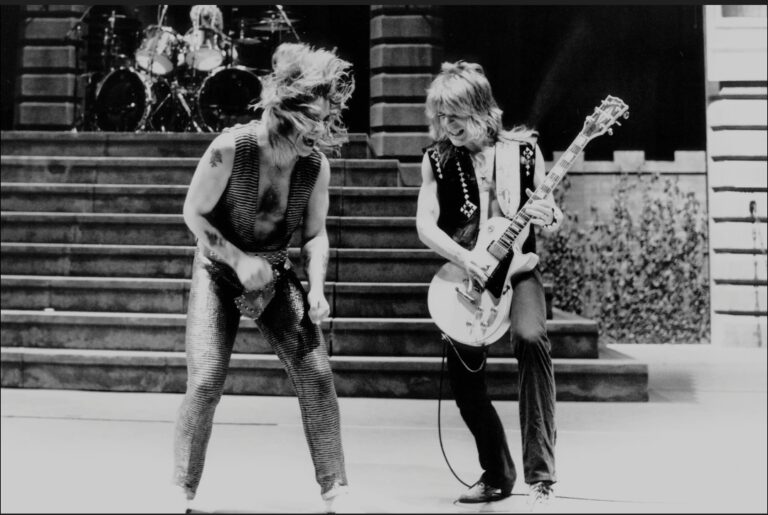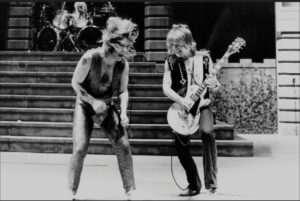The music world continues to mourn the loss of Ozzy Osbourne, the heavy-metal icon who passed away in July 2025 at the age of 76. Tributes have poured in, celebrating his inimitable voice, his knack for crafting macabre yet melodic anthems, and his electrifying stage presence. But among the many facets of Osbourne’s legacy, one stands out as particularly remarkable: his profound influence on the guitar world, despite never playing a single note on the instrument himself.
“I don’t play an instrument, I don’t understand music, I can’t even play chords on a guitar,” Osbourne once confessed in a candid video interview alongside his son, Jack. In a 2017 conversation with Rolling Stone, he expressed a tinge of regret: “That’s one of my biggest regrets. I can play a little bit of harmonica, and that’s about it. It’s been interesting, because I can’t communicate on a musical level with other musicians.” Yet, this self-professed musical outsider became a catalyst for some of the most iconic guitarists in rock and metal history, forever altering the trajectory of the genre.
Osbourne’s contribution to the guitar world was not through technical prowess but through his uncanny ability to spot and nurture talent. Like a heavy-metal alchemist, he transformed raw potential into legendary artistry, giving platforms to fledgling guitarists who would go on to define the genre. From his early days with Black Sabbath to his prolific solo career, Osbourne’s collaborations with six-string virtuosos produced some of the most enduring riffs and solos in rock history.
It began with Tony Iommi, the riff master whose dark, monolithic guitar work in Black Sabbath laid the foundation for heavy metal. Osbourne’s raw, haunting vocals paired perfectly with Iommi’s innovative detuned riffs, creating classics like “Paranoid” and “Iron Man” that remain touchstones of the genre. But Osbourne’s Midas touch truly shone in his solo career, where he introduced the world to a string of guitar heroes who might otherwise have remained in obscurity.
Chief among them was Randy Rhoads, the prodigiously talented young guitarist whose work on Osbourne’s first two solo albums, Blizzard of Ozz (1980) and Diary of a Madman (1981), redefined what metal guitar could be. “When I first heard Randy play, it was poetry in motion,” Osbourne recalled. “I thought, ‘Wow, I’m onto a good thing here.’” Rhoads’ neoclassical flourishes and jaw-dropping solos on tracks like “Crazy Train” and “Mr. Crowley” elevated metal guitar to new heights before his tragic death in 1982 at the age of 25. Without Osbourne’s platform, Rhoads might never have become the legend he is today.
The pattern continued with guitarists like Jake E. Lee, who brought a bluesy swagger to albums like The Ultimate Sin (1986), and Zakk Wylde, whose ferocious riffs and pinch-harmonic-laden solos defined Osbourne’s sound through the late ’80s and beyond on albums like No More Tears (1991). Each guitarist benefited from Osbourne’s ability to recognize raw talent and provide a stage for it to shine. “He had an eye for untapped genius,” one tribute noted, likening Osbourne to talent-spotters like John Mayall or David Bowie.
Unlike other musical luminaries lost in 2025—such as Mick Ralphs of Bad Company, Brian James of The Damned, or bluesman Joe Louis Walker—Osbourne never touched a fretboard. Yet, his absence from the narrative would have left a gaping hole in the guitar world. Without him, iconic riffs might never have been written, and guitarists who became household names might have languished in obscurity. His partnerships with Iommi, Rhoads, Lee, Wylde, and others produced a catalog of music that continues to inspire generations of players.
Tributes on platforms like X have echoed this sentiment. One user wrote, “Ozzy couldn’t play a note, but he gave us Randy Rhoads. That’s his legacy.” Another posted, “Every guitarist he worked with became a legend. That’s not luck—that’s Ozzy.” These sentiments underscore the depth of Osbourne’s influence, not just as a performer but as a visionary who shaped the sound of heavy metal.
Osbourne’s death marks the end of an era, but his impact on the guitar world endures. He may not have understood music theory or played a single chord, but through his voice, his vision, and his ability to ignite the talents of others, Ozzy Osbourne became one of the most significant figures in the history of rock guitar. As fans and musicians continue to celebrate his life, one thing is clear: the Prince of Darkness may have been no guitarist, but his shadow looms large over the six-string world.

